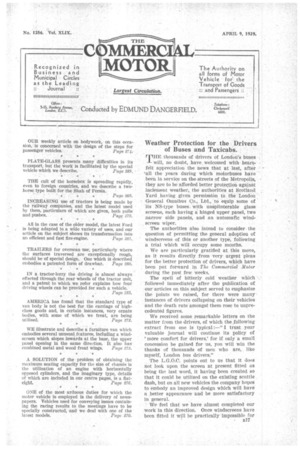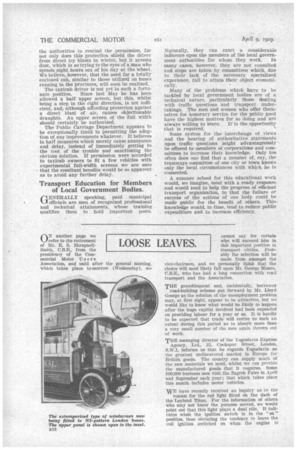Weather - Protection for the Drivers of Buses and 'Taxicab's.
Page 43

Page 44

If you've noticed an error in this article please click here to report it so we can fix it.
THE Ahousands of drivers of London's buses -Iwill, no doubt, have welcomed with heartfelt appreciation the news that at last, after +all the years during which' motorbuses have been. in service on the-streets of the Metropolis, they are to be afforded better protection against inclement weather, the authorities at Scotland Yard having given permission fo the Lond6a General Omnibus Co., Ltd., •tO equip some of • 'Its NS-type buses. with unsplinterable glass screens, each having a hinged upper panel, 'two narrow side panels, and an automatic wind. screen wiper.
• The authorities also intend to considerthe question of permitting the general adoption of • windscreens of this or another type, following a trial which will occupy some months. .
• We are particularly gratified at this move, as it results directly from 'very urgent pleas for the better protection of drivers, which have been put forward in Tlie Commercial Motor
during the past few, 'weeks. . The spell of bitterly cold weather which 'followed immediately after the publication of our articles on this subject served to emphasize the points we raised, for there were many instances of drivers collapsing on their vehicles and the death rate amongst them rose to unprecedented figures. We received some remarkable letters on the matter from the drivers, of which the following extract from one is typical:—" I trust . your valuable journal will continue its policy of more comfort for drivers,'for if only a small concession be gained for .us, you will win the thanks of thousands of men who are, like myself, London bus drivers."
The L.G.0.0. points out to us that it doea not look upon. the screen at present fitted as being the last word, it having been created so that it could be utilized on the existing scuttle dash, but on all new vehicles the company hopes to embody an improved design which will have a ,better appearance and be more satisfactory in general. We feel that we have almost completed. our work in this direction. Once windscreens have been fitted it will be practically impossible for u17 the authorities to rescind the permission, for not only does this protection shield the driver from direct icy blasts in winter, but it arrests dust, which is so trying to the eyes of a man who spends eight hours out of his day at the wheel. We believe, however, that the need for a totally enclosed cab, similar to those utilized on buses running in the provinces, will soon be realized.
The taxicab driver is not yet in such a fortu nate position. Since last May he has been allowed a half upper screen, but this, whilst being a step in the right direction, is not sufficient, and, although affording protection against a direct blast of air, causes objectionable draughts. An upper screen of the full width should certainly be authorized.
The Public Carriage Department appears to be exceptionally timid in permitting the adoption of any improvements whatever. It believes In half measures which merely cause annoyance and delay, instead of immediately getting to the root of the trouble and sanctioning the obvious solution. If permission were accorded to taxicab owners to fit a few vehicles with experimental full-width screens we are sure that the resultant benefits would be so apparent as to avoid any further delay.
Transport Education for Members of Local Government Bodies.
ENERALLY speaking, paid municipal k.31012lletals are men of recognized professional and technical attainments, whose training qualifies them to hold important posts. Naturally, they can exert a considerable influence upon the members of the local government authorities for whom they .work. In many cases, however, they are not consulted and steps are taken•by -committees which, due to their lack of the necessary specialized experience, fail to attain their object economically.
Many of the problems which have to be tackled by local government bodies are of a technical nature, particularly those dealing with traffic questions and transport undertakings. The men and women who offer themselves for honorary service for the public good have the highest motives for so doing and are always willing to learn. It is the opportunity that is required.
Some system for the interchange of views and the hearing of authoritative statements upon traffic questions might advantageously be offered to members of corporations and committees to increase their knowledge. Only too often does one find that a member of, say, the tramways committee of one city or town knows only the local circumstances with which he is connected.
A summer school for this educational work would, we imagine, meet with a ready response and would tend to help the progress of efficient transport organization, in that the failure or success of the actions of one body could be made public for the benefit of others. This knowledge would, in time, tend to reduce public expenditure and to increase efficiency.




















































































































